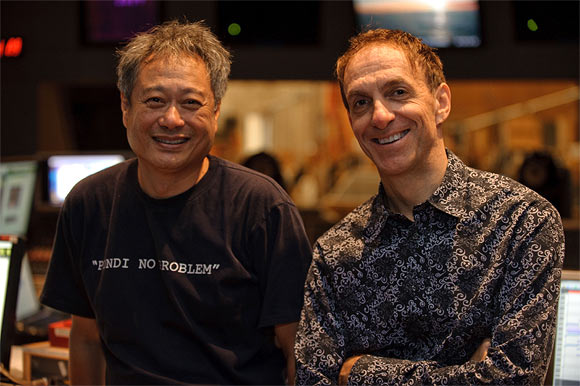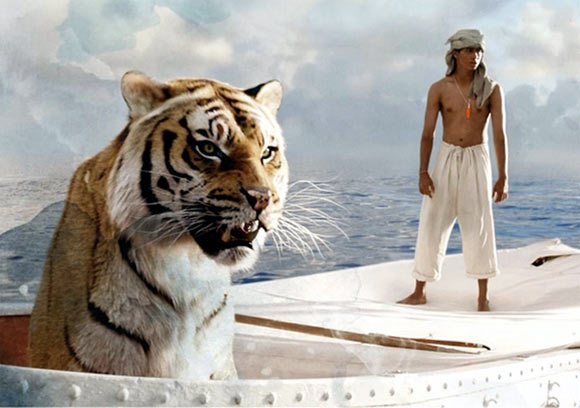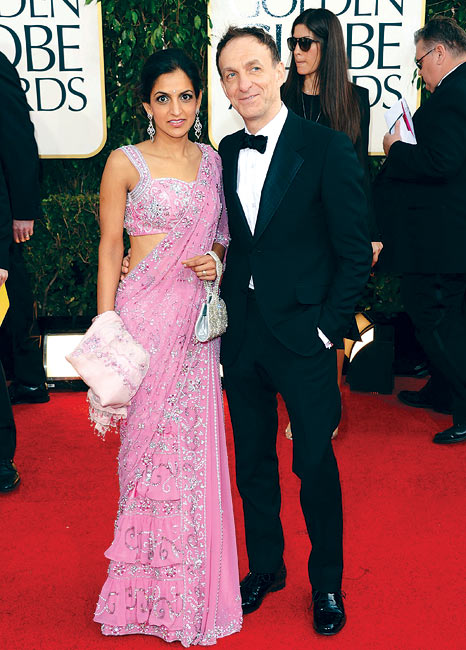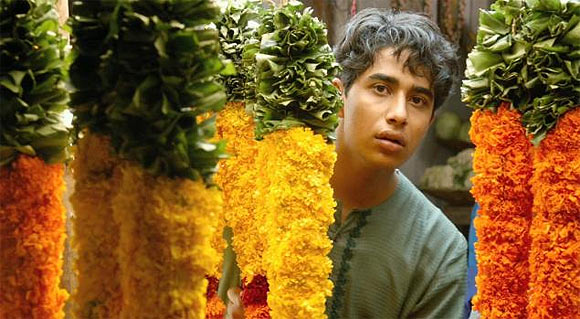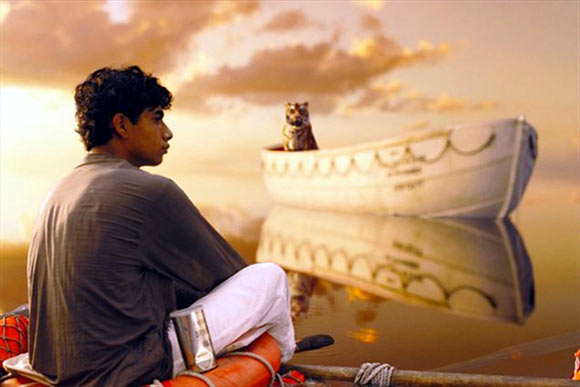This article was first published 12 years ago
'I am excited about the Oscars'
Last updated on: February 17, 2013 12:30 IST
Image: Mychael Danna with Ang Lee
Life Of Pi composer Mychael Danna -- who has earned nods at every A-list award ceremony this year, including a Golden Globe win -- speaks to Aseem Chhabra about the journey and its rewards.
Canadian composer Mychael Danna has had a rich career, balancing between composing for filmmakers from his country like Atom Egoyan (they have collaborated since 1988 starting with the filmmaker's first feature Family Viewing), Deepa Mehta (Water), Hollywood projects (Moneyball, Antwon Fisher, Capote) and hit indies (Little Miss Sunshine and (500) Days of Summer).
Danna's passion for international sounds has made him an expert in using world music in his scores. Because of his skills in blending Eastern and Western musical traditions, he is the go-to guy for most North American productions with international themes.
Over the years Danna, 54, has won a number of awards, but his rich India-infused score for Ang Lee's acclaimed Life Of Pi has placed him in the league of A-list composers, bringing him much-deserved recognition.
He won a Globe Globe for his work on the film, a BAFTA nomination for his Life Of Pi score, and is now nominated for two Oscars (for the score and the song Pi's Lullaby along with singer Bombay Jayashri).
The Toronto-based Danna spoke to Aseem Chhabra about working with Ang Lee and his passion for world music:
You had done three films with Ang Lee -- Hulk, Ride With The Devil and The Ice Storm. But Life Of Pi was very different, a very foreign project. What was Ang Lee looking for in terms of the music?
When the project came to him, he called me right away. That was five years ago.
He was kind of laughing and said, 'You were born to do this one. It's a Canadian book. You are Canadian and you are married to an Indian woman. You have had a long relationship with Indian music and working in India. This is a project for us to do together.'
So, we have been talking about the film for five years.
I had read the book before that and was thinking about a film based on the novel for a long time.
Ang is a very meticulous and a detailed filmmaker. Every craft and department in the film is immersed in what he is trying to say and the themes he wants us to illuminate.
So, we began speaking purely in philosophical and thematic terms for the first few years. I have pages and pages of notes from our detailed discussions.
We talked about what the book was about and what he wanted to capture, the big picture themes that had to be woven into the music and had to be part of what we were saying.
But we didn't have any musical discussions, until he started working on the film, other than knowing that we were going to have some touches of East and West. We had to be big in orchestral score. We kind of knew what the overall make up of the instruments was going to be.
But we didn't start to talk about the music until we started working with images, which was in the last year. Then I worked on the song with Bombay Jayashri.
Image: A scene from Life Of Pi
How did you know Bombay Jayashri?
I did know her work, in film and I was also aware of her classical work. When Ang described how he wanted to begin the film, it was set the scene of a children's paradise that Pi is born into. It was kind of idealised and romanticised, as a grown man looking at his childhood.
This beautiful zoo, the animals, a protective, loving family and a mother's love.
What better way to express it through a lullaby in Pi's native language, Tamil?
I knew we wanted someone who had a sweet voice that was gentle, a true South Indian classical vocalist, someone whose voice would also be very attractive to the West.
I knew Jayashri had that quality in her voice. It's a beautiful, soothing voice, the kind of voice you would want your mother to have.
I have heard that piece quite a few times. You have used Indian notes, but there are also Western tones.
Right, because I am Western. I grew up with a classical Western background. I have sung in choirs and studied piano and other instruments. My background is purely Western.
I was only introduced to Indian music later in my life. I have worked in India with a lot of great musicians.
Of course, my wife is Indian, so there is a lot of Indian pop and film music playing in our home. It's definitely a part of my character. But I am non-Indian. There will be a Western tone to it.
Also, it was important to Ang that the music should be like Pi, a character who is kind of borderless. He's born in a town where people also speak French and Tamil, so there is a blurring of East and West in his birth place.
Then he is floating across the ocean between cultures and he's very attracted to every different culture he comes across, or the various religions that he thinks are slightly different way of saying the same thing. He's a person who doesn't have those borders in his mind.
It was important that the music was flexible in that way. And it was part Eastern and part Western, but comfortable in both places. There wasn't a bump when you moved from one genre to another.
We have French accordions playing Indian melodies and a sitar playing French melodies and an English boys' choir singing in Sanskrit words.
We did our best to kind of stir the pot, as much as possible and blur all the borders, but not in a naive way, but rather in a sensitive, educated way.
I have spent a lot of time working on these different strains of music, so I didn't just throw it together. Hopefully, people can tell that there is some thought in it.
Image: Mychael Danna with wife Aparna
Photographs: Jason Merritt/Getty Images
I wanted to talk to you about your introduction to Indian music. You worked with Mira Nair on Kamasutra and then Monsoon Wedding, which had a Western orchestral sound, the love theme in the film, for instance. But in Deepa Mehta's Water, you used more Indian instruments and sounds.
Well, both of them had hybrid sounds as well. Maybe, the overall impression of Water is that it's a little folkier. But the melodies in both films were East and West. They were not quite exactly either.
Your introduction to Indian music was before that right?
I studied in college some Indian music and on my own I have listened to a great deal of it over the years. I am certainly not an expert, but I know my ears are fairly attuned to it, and I certainly know how to work with the players to get the sounds we need to get, which in film music is different for every scene.
What's fascinating is even in the work you have done with Atom Egoyan, using, for instance, Armenian music, you are able to bring the essence of the world music sounds into films that are very Western in their storytelling style.
I think maybe it's an advantage to being a Canadian. I was joking with Ang recently that Taiwan is the Canada of Asia. There's something about being a Canadian. It's a very multicultural country. It doesn't have a strong identity in that America, or Mexico or India have, where there is a kind of essence that is identifiable as an identity.
In Canada, there really isn't such a thing. So, there is a lot more observing and being able to immerse yourself in different cultures, sounds and music.
What I'm saying is that my blackboard is empty, having less of a strong identity of my own I guess, I have been able to immerse myself.
Most important is that I actually go to those countries. With Armenian music, a lot of people use the duduk, but how many people have actually gone to the Armenian region and worked there? I don't think very many. I have, and I think it's an important way to get into the culture and the music that you can't do sitting in Los Angeles.
Image: A scene from Life of Pi
You recorded both Monsoon Wedding and Water in India. What was that experience like?
I love working there. The music technology and the musicians, the session players are incredibly professional in Mumbai where I have mostly worked. They are used to churning out music quickly, just like in any other filmmaking center.
I always felt, as a composer, when you are working with non-Western instruments, especially instruments that have a strong identity, you need to go to them, not just physically, but compositionally.
You have to go at least half way to fit them in your scheme, understand their strengths and weaknesses.
It's like casting, getting actors for a movie. You try and match the role to the actual character of the human being.
It's the same thing with instruments. You use a bansuri (flute) -- it does certain things fantastically and there are other things it can't do and you need to understand that.
One of the things I have been curious about is that in Water A R Rahman composed the songs and you did the background score. How did the blend happen? Were you inspired by his compositions or did he hear your overall score first?
It was a bit of both. He wrote some of the songs earlier on, and then as I found the sound of the movie, I was trying to make it not electronic at all, just more acoustic and appropriate to the era.
I think we both worked that way to try and find a sound so that both his songs and my score would feel like they were coming from the same place. Definitely, the inspiration went in both directions.
Your wife Aparna is from India. How did you both meet?
We met in Toronto. I had a flat mate who was Indian and he grew up with her. Her parents were both born in India, but she was born here in Canada.
And what does she do?
She is in a completely different field, which I think can be a good thing for a partnership. Her degree is in business.
Image: A scene from Life of Pi
You said you listen to popular Indian music. Does Bollywood music play in your home?
Definitely. We watch Bollywood films and listen to music as well and classical music. There is a lot of different music played in our house. I like it that way.
Also, for the kids (Arjun, seven, and Keshav, two) it is good for them to hears different sounds.
I am a huge fan of Atom Egoyan's films and have been following your work for a long time. You have had such a rich career, so it is wonderful they are acknowledging you for such a major film.
Thank you. He and I, we started together and I am about to work on a new film, Devil's Knot. It stars Colin Firth and Reese Witherspoon.
Atom and I have worked together practically every year for the past 25 years.
So, are you excited about the Oscars?
Very much so. We had a great time at the Globes. It's really fun and exciting. At the end of such a difficult film to make, it is very rewarding.
What were the challenges, when you say it was a difficult film to make?
I think that for all of us involved in the film it was the fact that we were breaking new ground; there was no film like this. Everyone was aware of that.
Everyone in the industry said there is no way Ang could take the book and make it into a film that works. There is no way to capture this very novelistic novel and make a motion picture of out of. It was a challenge, we all felt.
Ang and I, and others all loved the book. And we felt the pressure of not wanting to fail or cheat the book and make something that was not up to the standards of the book. It was very important that we get across this beautiful story and give it due credit.
So, it was difficult to figure out how to make it work on just about any level. We had to solve the structure, musically how to make it Eastern and Western and still attractive and track the emotional journey. It was very complicated.
So, to be at the point where the film has received such a warm reception around the world, it is such a feeling of accomplishment.
